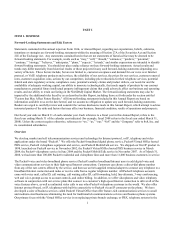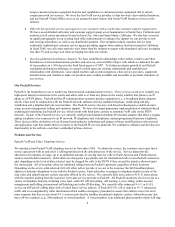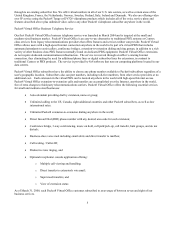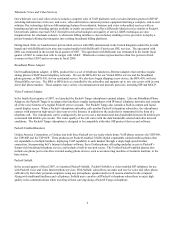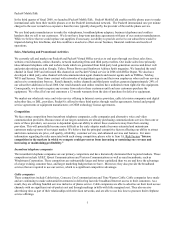8x8 2008 Annual Report Download - page 12
Download and view the complete annual report
Please find page 12 of the 2008 8x8 annual report below. You can navigate through the pages in the report by either clicking on the pages listed below, or by using the keyword search tool below to find specific information within the annual report.10
authority when it required interconnected VoIP service providers to contribute to the Universal Service Fund, though it struck
down the provision of the order which required pre-approval of traffic studies by the FCC and the provision that required
double contributions to the fund for two quarters from our underlying carriers' wholesale charges. As of July 1, 2007, we use
the results of our traffic study to calculate the required contribution to the USF. Moreover, the FCC recently released an Order
clarifying how providers that rely on traffic studies to calculate their USF contributions should assess certain revenues
associated with minutes-of-use charges. We are still evaluating the impact of this Order on our USF contribution but it may
require us to increase our contribution, resulting in higher pass-through charges to our customers. In the meantime, the FCC
continues to evaluate alternative methods for assessing USF charges, including imposing an assessment on telephone numbers.
The outcome of these proceedings cannot be determined at this time nor can we determine the potential financial impact as the
details of an alternative method of USF contribution have not yet been determined. There is also a risk that state Universal
Service Funds may attempt to impose state USF contribution obligations and other state and local charges. At this time, at least
three states, including Nebraska, contend that providers of interconnected VoIP services, like us, should contribute to its USF
fund. On March 3, 2008, the U.S. District Court for Nebraska issued a preliminary injunction and found that Nebraska’ s state
Public Service Commission does not have jurisdiction to require Universal Service contributions from VoIP providers. The
proceeding was recently stayed while the U.S. Court of Appeals for the Eighth Circuit considers an appeal filed by the
Nebraska Public Service Commission regarding this matter. We cannot predict the final outcome of this litigation nor its
impact on us at this time. As of March 31, 2008, we were not collecting or remitting any state USF.
On April 2, 2007, the FCC released an order extending the application of customer proprietary network information, or CPNI,
rules to interconnected VoIP providers. CPNI includes information such as the phone numbers called by a consumer; the
frequency, duration, and timing of such calls; and any services/features purchased by the consumer, such as call waiting, call
forwarding, and caller ID, in addition to other information that may appear on a consumer’ s bill. Under the FCC’ s existing
rules, carriers may not use CPNI without customer approval except in narrow circumstances related to their provision of
existing services, and must comply with detailed customer approval processes when using CPNI outside of these narrow
circumstances. The new CPNI requirements are aimed at establishing more stringent security measures for access to a
customer’ s CPNI data in the form of required passwords for on-line access and call-in access to account information as well as
customer notification of account or password changes. Currently, we do not utilize our customer’ s CPNI in a manner which
would require us to obtain consent from our customers, but in the event that we do in the future, we will be required to adhere
to specific CPNI rules aimed at how such information is utilized. Effective December 8, 2007, we implemented internal
processes in order to be compliant with all of the FCC’ s other CPNI rules and we filed our first, annual certification of our
compliance with CPNI rules with the FCC on February 29, 2008. These rules may impose additional compliance costs on our
business and reduce our profitability or cause us to increase the retail price for our services.
On June 1, 2007, the FCC released a Notice of Proposed Rulemaking Proceeding to consider whether it should impose
additional VoIP E-911 obligations on interconnected VoIP providers including consideration of a requirement that
interconnected VoIP providers automatically determine the physical location of their customer rather than allow customers to
manually register their location. The Notice includes a tentative conclusion that all interconnected VoIP service providers that
allow customers to use their service in more than one location (nomadic VoIP service providers such as us) must utilize
automatic location technology that meets the same accuracy standards applicable to providers of commercial mobile radio
services (mobile phone service providers). We cannot predict the outcome of this proceeding nor its impact on our business at
this time.
On June 8, 2007, the FCC released an order implementing various recommendations from its Independent Panel Reviewing the
Impact of Hurricane Katrina on Communications Networks Panel, including a requirement that certain interconnected VoIP
providers submit reports regarding the reliability and resiliency of their 9-1-1 systems. At this time, we are not subject to these
reporting requirements but may become subject in future years.
On June 15, 2007, the FCC extended the disability access requirements of Sections 225 and 255 of the Communications Act,
which applied to traditional phone services, to providers of interconnected VoIP services and to manufacturers of specially
designed equipment used to provide those services. Section 255 of the Communications Act requires service providers to
ensure that its equipment and service is accessible to and usable by individuals with disabilities, if readily achievable, including
requiring service providers to ensure that information and documentation provided in connection with equipment or services be
accessible to people with disabilities, where readily achievable and that employee training account for accessibility
requirements. In addition, the FCC said that interconnected VoIP providers were subject to the requirements of Section 225,
including contributing to the Telecommunications Relay Services, or TRS, fund and that they must offer 7-1-1 abbreviated
dialing for access to relay services. At this time, we cannot predict the impact of these rules on our business or our ability to
comply with these disability access obligations. We may be subject to enforcement actions including, but not limited to, fines,
cease and desist orders, or other penalties if we are not able to comply with these new disability obligations. The rules



